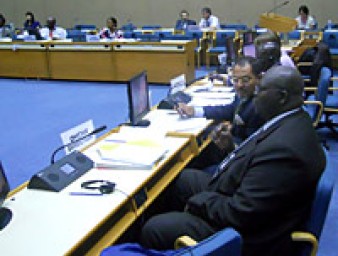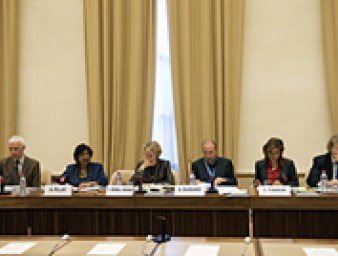“The world is moving online”: promoting freedom of expression
09 March 2012

How can the right to freedom of expression be respected, protected and promoted when exercised through the Internet? Is there a need to define new rules for human rights on the Internet? And how can we bridge the digital divide, and attain universal access to the Internet? Under international human rights law, limitations of freedom of expression are permissible in exceptional cases, such as child pornography and incitement to hatred: what are the most effective ways in which such exceptional cases can be taken into account, without jeopardizing the right to freedom of opinion and expression?
These and other questions were the focus of the first-ever panel discussion on the right to freedom of expression on the Internet held by the UN Human Rights Council on 29 February 2012.
Like no other communications medium before it, the Internet allows individuals to communicate instantaneously and inexpensively, and it has had a dramatic impact on the way information and ideas are shared and accessed.
“The Internet has transformed human rights movements,” said UN Human Rights chief Navi Pillay. “States can no longer exercise control by claiming a monopoly over information.”
“This has resulted in a backlash effect and intensified attempts to unduly restrict access to online content or Internet as such,” she stressed. While there is a need to combat criminal activities on the Internet, “there is also a real concern that methods to identify and track down criminals may be used to crack down on human rights defenders and suppress dissenting voices,” Pillay noted.
“Currently 40 countries sanction the Internet, up considerably from a few years ago,” explained William Echikson, Head of External Relations for Google. “Among the 150 countries where Google operates, 25 countries ban or block Google’s products.”
Carl Bildt, Minister of Foreign Affairs of Sweden, said that the “freedoms and human rights that we cherish in the off-line world must also be protected in the on-line world.” Failure to do so means that “as we switch on to the online world, we switch off our freedoms.” For Bildt, hate speech, for example, should and could be stopped by the same laws for the Internet as on print media.
“Whether through oral or written words, art or any other form of expression, the same basic international norms and standards on the right to freedom of expression apply,” said Frank La Rue, UN expert on the right to freedom of opinion and expression.” “We do not need new standards on human rights for the Internet,” he stressed.
In his latest reports to the Human Rights Council and the General Assembly, La Rue underscored that the types of information or expression that may be restricted under international human rights law in relation to off-line content also apply to online content.
“There is an increasing trend to criminalize the Internet, and as a result, there is a need for a decriminalization campaign for the Internet,” he said at the panel. La Rue stressed the need for a multi-stakeholder dialogue to establish acceptable mechanisms to regulate exceptional types of content deemed to be illegal under international law, including measures such as blocking and filtering.
He also suggested that the Council could adopt a declaration recognizing the indispensable role of the Internet to exercise the right to freedom of expression, and condemning censorship on the Internet. On the question of access to the internet, La Rue said that it is crucial to understand that it was a question of freedom of expression and the international community should strive towards Internet access for everyone.
The Internet has become a vital communications medium which individuals can use to exercise their right to freedom of expression, or the right to seek, receive and impart information and ideas of all kinds, regardless of frontiers, as guaranteed under articles 19 of both the Universal Declaration of Human Rightsand the International Covenant on Civil and Political Rights.
9 March 2012




